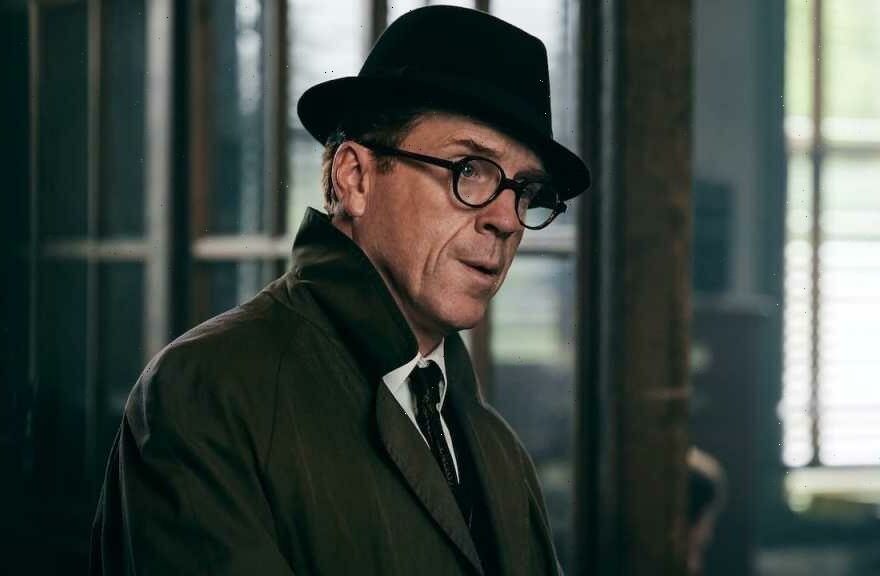Nothing has quite the same screen allure as a secret world. Espionage is so secret, by definition, that we have to take even its existence as a matter of trust; all we know about what goes on behind the intelligence agencies’ closed doors is what is relayed to us through books, films and series like A Spy Among Friends, based on Ben Macintyre’s book about the British double agent Kim Philby. Presumably, a certain kind of person is drawn to that world where nothing can be let slip outside it. To work for both sides, one must constantly be aware of who said what to whom, who knows what, who saw you where, who remembers you there — that anyone should want that life is a mystery in itself.
A Spy Among Friends – two episodes of which are screening as part of the London Film Festival – reunites Alexander Cary, a writer and producer on the long-running espionage series Homeland, with actor Damian Lewis, who also steps up as an executive producer of the new series. Lewis is best known on both sides of the Atlantic as Homeland’s Nicholas Brody, the Marine Corps sniper imprisoned and possibly “turned” by Al-Qaeda. Here he enters another secret world, but in a very different guise: He plays Nicholas Elliott, an operative with foreign security agency SIS, who also is the closest friend of Philby (Guy Pearce).
While the spies in Homeland were at the edge of the world, teetering on the brink of insanity, Elliott and Philby are at the heart of things, which is not to say it is particularly glamorous. Philby was unmasked as a KGB agent in 1963. A Spy Among Friends takes place in a series of dark offices and drawing rooms that, even on the small screen, look decidedly cold and frequently shabby. Even so, there is no doubting their privilege. As portrayed by writer and showrunner Cary, Philby and Elliott were united by both calling and class. Both were clubbable, debonair, at ease and in no doubt of their own superiority.
Even by the standards of the game, Elliott plays his cards close to his chest. So does Lewis, for that matter, with his Mona Lisa smirk and quietly clipped voice, both calculated never to display surprise. When Philby is rumbled, it is his chum Elliott who goes to Beirut to coax a confession and a deal out of his old friend that would allow him to retire gracefully to the country and save everyone’s face. That is the story, anyway. Even at the eleventh hour, the operatives at SIS – a coterie of Oxbridge men who believe they instinctively understand one another – hope to emerge from this potential scandal with a gentlemen’s agreement.
Pearce plays Kim Philby as if he were born to the role: He is arrogant but winning with it, the center of every party who can drink a bar dry without any faltering of control. It is a shock in the second episode to see him sweating through Elliott’s four days of interrogation, his savoir-faire disintegrating even as he steadfastly denies that he is a traitor. Philby’s treason is an often-told story, but Elliott is an unknown figure. The unfolding of their negotiations and the nature of the friendship underpinning them is not seat-of-your-pants televisual excitement, but it is the stuff of sustained intrigue – enough to keep us watching for six episodes, certainly.
What also might keep us on the couch is the sense of a society changing, not so much at its heart as around its edges. Cary structures his plot as a series of oppositions: between Elliott and Philby, of course, but also between the upper-crust SIS – which would become MI6 – and the investigators of MI5 who often had crossed over from the police forces, between men and the women they find largely unfathomable, between the British and Americans, between the West and Russia.
Sometimes, what is curious is how similar the two sides of each coin can be. Parallel interrogation sessions in London and Moscow mirror each other; since nobody trusts anybody, they ask the same questions. Elliott is interrogated by a woman from MI5 with a northern accent and, unknown to him, a West Indian husband at home who frets – just as Philby’s wife did – that he doesn’t know much about her. There is a sense that what Elliott finds most disturbing about being questioned at all is that the questioner is not of his class. Or gender, obviously. That’s not how things were supposed to be done. They were supposed to be kept between friends. There are hints that this is exactly what he will try to do.
Must Read Stories
‘Smile’ Joyful With $13M+ 2nd Weekend; ‘Lyle, Lyle’ Eyes $11M; Red Light For ‘Amsterdam’

Paramount TV Studios & CBS Studios Continue To Operate Independently Amid Reorg

‘House Of The Dragon’ Showrunner Ryan Condal Extends Overall Deal With HBO

Anthony Rapp Takes Stand In His Sexual Misconduct Suit Against Kevin Spacey

Read More About:
Source: Read Full Article
